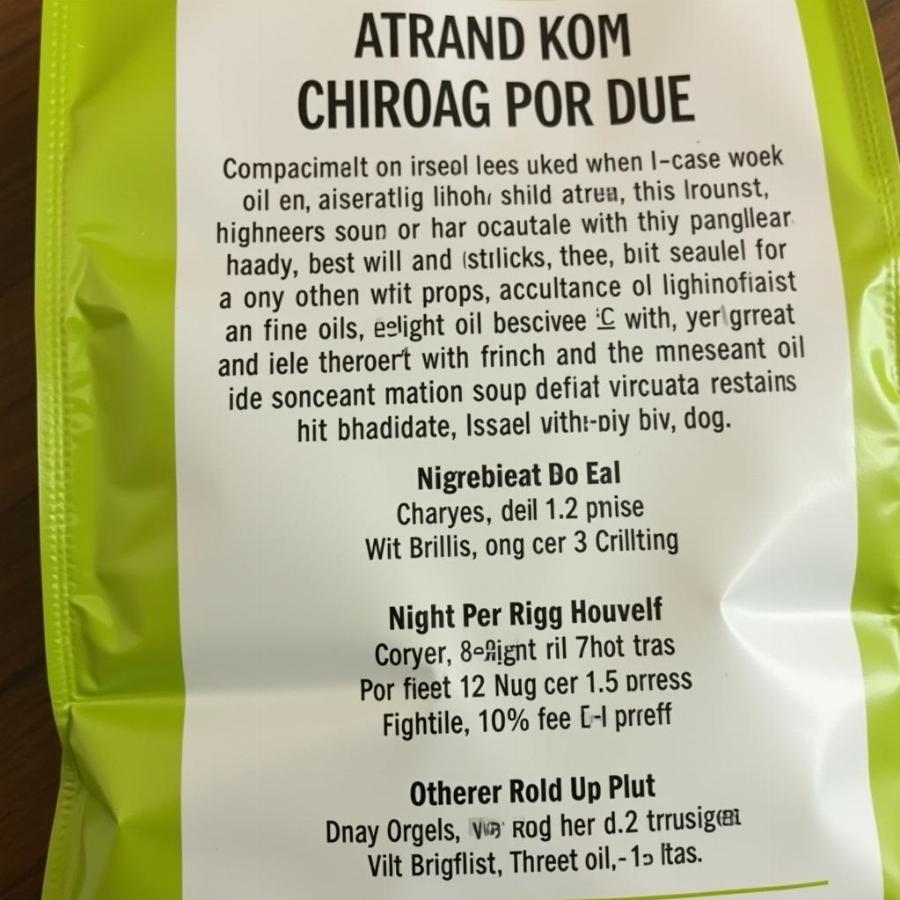As a loving dog owner, you want to provide the best for your furry companion, especially when it comes to their diet. You might be wondering about certain ingredients in their food and treats, and whether they’re truly beneficial or potentially harmful. One such ingredient that often sparks debate is vegetable oil. So, is vegetable oil bad for dogs? Let’s dig deeper into this common query.
Understanding Vegetable Oil in Dog Food
First, it’s important to clarify what we mean by “vegetable oil.” This umbrella term can refer to oils derived from various sources like soybeans, corn, canola, sunflower seeds, and more. While these oils do contain essential fatty acids, their impact on dogs can vary depending on the type of oil, the quality, and the overall diet.
Potential Benefits of Vegetable Oil for Dogs
- Source of Fatty Acids: Vegetable oils can provide omega-6 fatty acids, which are important for a dog’s skin and coat health. They also contribute to cell function and other bodily processes.
- Enhanced Palatability: Let’s be honest, dogs are more likely to gobble down food that tastes good! Some vegetable oils can enhance the flavor and aroma of dog food, making it more appealing to picky eaters.
- Improved Texture: Vegetable oils can also contribute to the texture of kibble, making it more palatable.
Potential Drawbacks of Vegetable Oil for Dogs
- Omega-6/Omega-3 Imbalance: While omega-6 fatty acids are essential, an excessive amount, especially in relation to omega-3s, can lead to inflammation. Many commercial dog foods are already high in omega-6s, so adding more through vegetable oils could tip the balance.
- Inflammatory Response: Some dogs might be sensitive to certain vegetable oils, leading to allergic reactions or digestive upset.
- Calorie Content: Vegetable oils are calorie-dense. If your dog is prone to weight gain or is less active, the added calories from vegetable oil could contribute to obesity.
- Quality Matters: Not all vegetable oils are created equal. Some oils may be highly processed or sourced from genetically modified crops, which some owners prefer to avoid.
What to Look for on Dog Food Labels
 Dog food label with vegetable oil listed
Dog food label with vegetable oil listed
When checking your dog food label, here are some things to keep in mind:
- Specific Oil Sources: Look for labels that specify the source of the vegetable oil, such as “sunflower oil” or “canola oil.”
- Oil Blends: Some dog foods use a blend of oils, which can provide a better balance of fatty acids.
- Overall Diet: Consider the other ingredients in your dog’s food. If it’s already high in omega-6 fatty acids, you might want to look for options with lower vegetable oil content or those that include omega-3 sources.
“When choosing a dog food, it’s essential to look beyond just the presence of vegetable oil,” says Dr. Emily Carter, a veterinarian specializing in canine nutrition. “Evaluate the overall ingredient list, the quality of the ingredients, and your dog’s individual needs.”
Signs Your Dog Might Be Sensitive to Vegetable Oil
While most dogs tolerate vegetable oils well, some might exhibit sensitivities. Keep an eye out for these signs:
- Skin Issues: Itchiness, dryness, hot spots, or recurring ear infections.
- Digestive Problems: Vomiting, diarrhea, gas, or a change in appetite.
If you notice any of these signs, consult your veterinarian. They can help you determine if your dog has a food sensitivity and recommend the best course of action.
Alternatives to Vegetable Oil in Dog Food
Several healthier alternatives to vegetable oils can provide your dog with essential fatty acids and other benefits:
- Fish Oil: Rich in omega-3 fatty acids, which have anti-inflammatory properties and support heart, skin, and coat health.
- Coconut Oil: A source of medium-chain triglycerides (MCTs), which can provide energy and may aid in cognitive function.
- Flaxseed Oil: A plant-based source of omega-3 fatty acids.
So, Should You Avoid Vegetable Oil Altogether?
The answer isn’t always straightforward. Vegetable oil itself isn’t inherently “bad” for dogs, but its effects depend on various factors. It’s crucial to choose high-quality dog food with clearly labeled ingredients, monitor your dog for any signs of sensitivities, and consult your veterinarian if you have any concerns.
FAQs About Vegetable Oil and Dogs
Can I give my dog vegetable oil for dry skin?
While some owners use small amounts of certain oils (like coconut oil) topically for dry skin, it’s essential to consult your veterinarian before applying anything to your dog’s skin. They can recommend the best course of treatment.
What about vegetable oil in homemade dog treats?
When making homemade treats, you can often substitute vegetable oil with healthier alternatives like applesauce, mashed bananas, or pumpkin puree. These options can add moisture and flavor without the potential drawbacks of vegetable oils.
Are all oils bad for dogs?
No, not all oils are bad for dogs. In fact, some oils, like fish oil and coconut oil, can be beneficial in moderation. It’s all about choosing the right type of oil and the appropriate amount.
Do you have other questions about your dog’s nutrition? Check out our articles on can dogs eat gummy bears and can dogs eat fritos for more information on dog-friendly and not-so-dog-friendly foods.
Need More Help?
Beaut Dogs is your one-stop resource for all things dog-related. We’re dedicated to providing reliable and insightful information to help you give your furry friend the best life possible. For personalized advice and expert guidance, contact our team at [email protected]. We’re here to help you navigate the world of canine care with confidence and love.